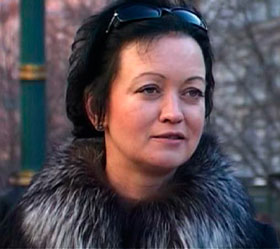Elena Tonkacheva’s deportation shows “pervasive harassment of rights defenders in Belarus”
GENEVA (6 March 2015) – The Special Rapporteur on the human rights situation in Belarus, Miklós Haraszti, today said that the recent deportation from Belarus of Elena Tonkacheva “demonstrates the immense challenges that continue to exist for human rights defenders to fulfil their work in Belarus.”
Ms. Tonkacheva, a well-known human rights defender, was expelled from Belarus on 21 February 2015 and banned from entering the country for three years after losing her final appeal.
“This clearly disproportionate measure has been taken by the Government in retaliation for Ms. Tonkacheva’s human rights work in the country,” the Special Rapporteur stressed. “Such an act constitutes a violation of Belarus’s human rights obligations under international law.”
Ms. Tonkacheva, the Chairperson of the board of the Centre for Legal Transformation (LawTrend), is a citizen of the Russian Federation who has been permanently residing with her family in Belarus since 1985. Law Trend’s reliable reports have provided a vital service to the independent media, to UN human rights mechanisms and other international and intergovernmental organisations.
The order was issued against the human rights defender following the cancellation of her residence permit on 30 October 2014 – an administrative decision based on alleged speed limit violations while driving her car.
On 5 November 2014, Tonkacheva was ordered to leave Belarus within one month and not return to the country for a period of three years. The Special Rapporteur urged the Belarusian authorities to immediately stop all administrative procedures and reinstate her rights.
Ms. Tonkacheva lodged an appeal against the decision to expel her on 28 November, which was denied by the main police department of Minsk on 12 December 2014.
In a preliminary hearing on 12 January 2015, she requested that the Pershamaiski District Court of Minsk overturn the decision to expel her from the country, arguing that the allegations against her were groundless and unreliable. Nevertheless, on 13 January 2015, the Court upheld the decision to deport her.
An extension of Ms. Tonkacheva’s stay in Belarus was granted until 21 February 2015, pending the decision of the board on civil cases of the Minsk City Court. However, the board dismissed her final appeal on 19 February 2015 and she was ordered to leave the country by 21 February 2015.
In his 2014 report* to the UN General Assembly, the Special Rapporteur had already expressed his deep concern about the conditions that exist in Belarus for human rights defenders to fulfil their work.
The Special Rapporteur on the situation of human rights defenders, Michel Forst, endorsed this statement as well as Mr. Haraszti’s concerns about the pervasive harassment and persecution of rights activists in Belarus. Both Rapporteurs have called on the Government to accept their repeated requests to visit the country in order to assess, in the spirit of dialogue and cooperation, the environment in which civil society representatives operate in Belarus.
(*) Check all the Special Rapporteur’s reports on Belarus: http://ap.ohchr.org/documents/dpage_e.aspx?m=140
Mr. Miklós Haraszti (Hungary) was designated as Special Rapporteur on the situation of human rights in Belarus by the UN Human Rights Council in 2012. In the 70s, Mr. Haraszti was a founder of Hungary’s human rights and free press movement, and in the 1990s he was a Member of the Hungarian Parliament. From 2004 to 2010, he served as the OSCE Representative on Freedom of the Media. Since 2010, he has been a Professor at several universities teaching media democratisation. Learn more, log on to: http://www.ohchr.org/EN/HRBodies/SP/CountriesMandates/BY/Pages/SRBelarus.aspx
Mr. Michel Forst (France) was appointed as the Special Rapporteur on the situation of human rights defenders by the Human Rights Council in 2014. He has extensive experience on human rights issues, including human rights defenders, the rights of children with disabilities, extreme poverty, and the elderly. Mr. Forst has held a number of leading positions in the French National Consultative Commission on Human Rights, the Cimade, UNESCO, and Amnesty International. He was the Independent Expert on the situation of human rights in Haiti. For further information, visit: http://www.ohchr.org/EN/Issues/SRHRDefenders/Pages/SRHRDefendersIndex.aspx
The Special Rapporteurs are part of what is known as the Special Procedures of the Human Rights Council. Special Procedures, the largest body of independent experts in the UN Human Rights system, is the general name of the Council’s independent fact-finding and monitoring mechanisms that address either specific country situations or thematic issues in all parts of the world. Special Procedures’ experts work on a voluntary basis; they are not UN staff and do not receive a salary for their work. They are independent from any government or organization and serve in their individual capacity.
UN Human Rights, country page – Belarus: http://www.ohchr.org/EN/countries/ENACARegion/Pages/BYIndex.aspx
For more information and media requests please contact Ms. Alexandra Swetzer (+41 22 917 9401 / aswetzer@ohchr.org) or write to sr-belarus@ohchr.org.
For media inquiries related to other UN independent experts:
Xabier Celaya, UN Human Rights – Media Unit (+ 41 22 917 9383 / xcelaya@ohchr.org)


















